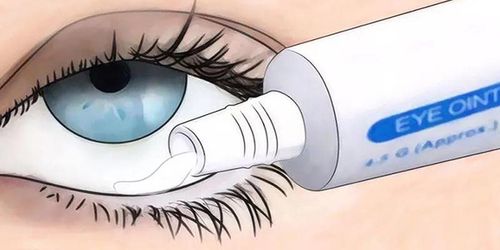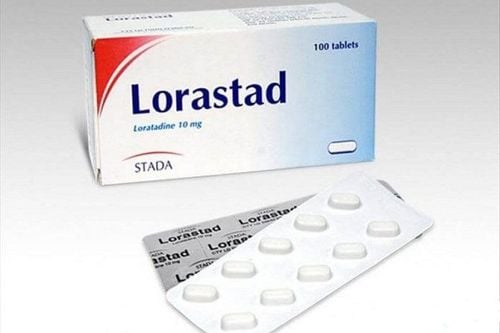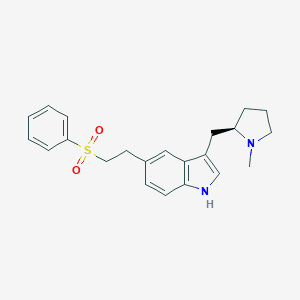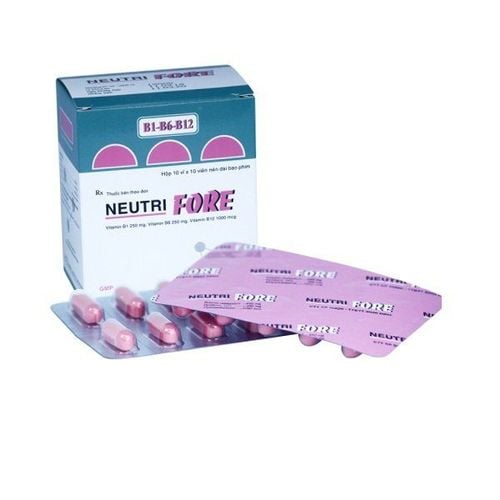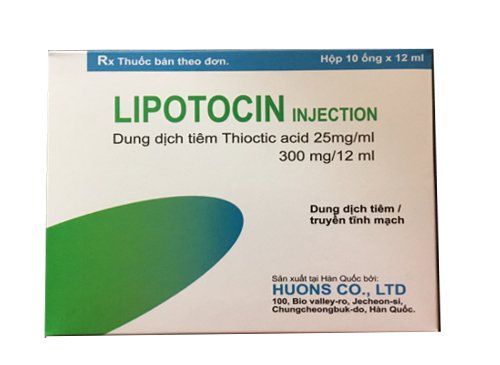This is an automatically translated article.
Histalife is made in the form of tablets, with the main ingredient being Cyproheptadine hydrochloride. The drug is used in the treatment of allergies, itchy skin, and migraines.
1. What is Histalife?
One Histalife tablet has Cyproheptadine hydrochloride 4mg as the main ingredient and other excipients. Cyproheptadine is a 2nd generation histamine antagonist, belonging to the piperidone group, with anticholinergic and sedative effects due to the mechanism of competition for binding sites of histamine on receptors. Cyproheptadine relieves bronchospasm, reduces edema, reduces gastric secretion and vasoconstriction increases blood pressure.
On the central nervous system, Cyproheptadin has sedative effects, induces sleep, increases ADH secretion and stimulates appetite. Besides, the drug also has an effect on intestinal smooth muscle, reducing smooth muscle spasm. In addition, Cyproheptadine also inhibits the increase of gastric secretion caused by histamine. Cyproheptadine is considered to be effective in the treatment of cases where other standard antihistamines are not used.
Indications for use of Histalife:
Treatment of acute and chronic allergic and itchy skin: Polyneuritis and peripheral polyneuritis; eczema dermatitis; allergic reactions to mild, local insect bites; seasonal allergic rhinitis, perennial rhinitis, vasomotor rhinitis; food-borne allergic conjunctivitis and allergen inhalation; mild and uncomplicated skin allergies (manifestations of urticaria and angioedema); allergic reactions to blood or serum, chickenpox pruritus, anal-genital pruritus; Treatment of migraine and vasoconstrictor headaches. Contraindications to the use of Histalife:
Patients with hypersensitivity to cyproheptadin or other components of the drug; Children under 2 years old; The patient is being treated for an acute asthma attack; Concomitant use with MAOI inhibitors; Patients with angle-closure glaucoma; Patients with gastroduodenal stenosis; Patients with enlarged prostate gland ; Patients with bladder neck obstruction; Patients with pyloroduodenal obstruction; Women who are breastfeeding; Elderly, debilitated body.
2. Usage and dosage of Histalife
Treatment of allergies and itchy skin: Dosage depends on the needs and response of the patient: Children 7-14 years old: Take 1 tablet/time x 2-3 times/day, not to exceed 16mg/day; Children 2 - 6 years old: Use drugs in other dosage forms; Adults: The total daily dose should not exceed 0.5mg/kg/day. Usually use 1 tablet/time x 3 times/day, do not exceed 32mg/day; Treatment of headache: Prophylaxis and treatment: Start with 1 tablet, repeat after 30 minutes if necessary. Patients usually respond well to a dose of 2 tablets, this dose should not be exceeded in 4-6 hours; Maintenance dose: 1 tablet every 4-6 hours. Overdose: Symptoms of Histalife overdose may include central nervous system depression, excitation, convulsions, respiratory and cardiac arrest, and death (especially in infants and children). Atropine-like and gastrointestinal symptoms may also occur. If the patient is not vomiting, vomiting should be induced with syrup of ipeca. If the patient is still unable to vomit, the patient's stomach should be flushed with isotonic or semi-isotonic saline, followed by activated charcoal. Precautions should be taken to prevent aspiration (especially in infants and children).
It is possible for patients to use salt bleach to get water into the intestinal tract by osmosis, diluting the drug solution in the intestine quickly. The use of antihypertensive drugs may be necessary to counteract hypotension in patients with drug overdose.
If a dose of Histalife is forgotten, the patient should continue taking the medicine as directed by the doctor.
3. Side effects of the drug Histalife
When using Histalife, patients may experience some side effects such as:
Blood and lymphatic system: Leukopenia, hemolytic anemia, thrombocytopenia, agranulocytosis; Immune: Allergic rash, edema, anaphylaxis; Metabolic: Eating disorders (loss of appetite or increased appetite); Psychiatric: Restlessness, restlessness, confusion, irritability, insomnia, nervousness, hallucinations, agitation, aggressive behavior, euphoria; Nervous: Sedation, drowsiness, dizziness, paresthesia, tremor, convulsions, neuritis, syncope, headache; Respiratory: Dry nose and throat, stuffy nose, wheezing, coughing up blood, angina; Stomach - intestines: Nausea, vomiting, epigastric pain, constipation, diarrhea, dry mouth; Hepatobiliary: Liver failure, hepatitis, jaundice, abnormal liver function, increased cholesterol; Skin: Urticaria, profuse sweating, photosensitivity; Renal - urinary: urinary retention or difficulty urinating; Fertility: Early menopause. Patients should inform their doctor about the side effects encountered when using Histalife drug for appropriate intervention and treatment.
4. Be careful when taking Histalife
Some notes patients need to remember before and while taking Histalife:
Should not take Histalife to treat symptoms of lower respiratory tract disease, including acute asthma; The safety and effectiveness of Histalife in children under 2 years of age have not been evaluated; An overdose of Histalife, especially in infants and children, can cause hallucinations, depression, convulsions, respiratory and cardiac arrest, and even death; Histalife may decrease alertness or cause irritability (in young children); Patients taking Histalife should not engage in activities that require mental alertness such as driving or operating machinery because this drug can cause drowsiness, especially in the early stages of treatment; Prolonged treatment with Histalife may cause blood disorders; Cyproheptadine (the main ingredient of the drug Histalife) has atropine-like effects, so it should be used with caution in patients with a history of bronchial asthma, hyperthyroidism, glaucoma, cardiovascular disease or hypertension; Histalife medicine contains lactose, so patients with galactose intolerance disorders, glucose - galactose absorption disorders should not take this medicine; Histalife contains dextrose, so it should be used with caution in people with diabetes; Histalife should not be used during pregnancy; Histalife should not be used in lactating women, if so, breast-feeding must be stopped (as directed by your doctor).
5. Histalife drug interactions
Drug interactions can cause synergistic effects (enhanced effectiveness, drug effects) or reduce the effectiveness, increase side effects of one or more drugs. Therefore, patients should inform the doctor about their medical history and medication use, share about the drugs they have been using so that the doctor can consider and adjust appropriately. At the same time, the patient must not arbitrarily stop the drug, start using a new drug, change the dose, ... without the doctor's permission.
Some drug interactions of Histalife include:
Using Histalife together with MAO inhibitors will prolong and increase the anticholinergic effects of cyproheptadin; Simultaneous use of Histalife with alcohol, CNS depressants (analgesics, sleeping pills, sedatives and anti-anxiety agents) can cause synergistic effects; Histalife may interfere with antidepressants that increase serotonin transmission (including selective serotonin reuptake inhibitors), which may lead to relapse of depression, related symptoms; Cyproheptadine can cause false-positive test results with tricyclic antidepressants because Cyproheptadine and TCAs can produce similar overdose symptoms. When prescribed to use Histalife, the patient should strictly follow the instructions of the treating doctor. This is the minimum rule for the patient to get the most effective treatment and significantly reduce the risk of unpredictable events.
Please dial HOTLINE for more information or register for an appointment HERE. Download MyVinmec app to make appointments faster and to manage your bookings easily.




